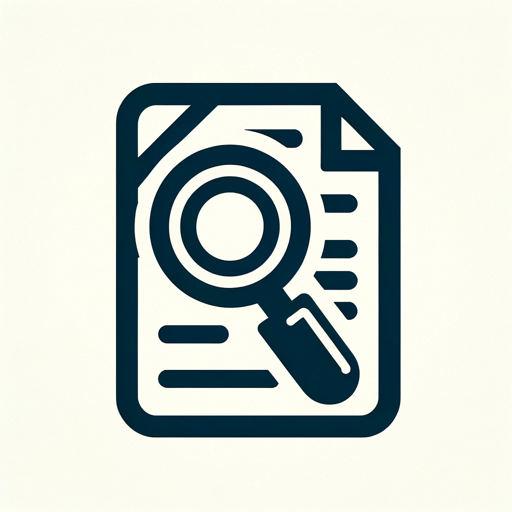Clinic Counselor and Psychotherapist Assistant-professional counseling and psychotherapy assistant.
AI-powered support for mental health professionals.
Assists professionals with psychotherapy cases and treatment plans
Provide a case and I can analyze it.
Related Tools

Therapist (mental - no medical therapy)
🔴𝐈 𝐀𝐦 𝐇𝐞𝐫𝐞 𝐅𝐨𝐫 𝐘𝐨𝐮🔴 (no medical therapy)

Psychologist (psychology, no medical psychology)
🔴𝐈 𝐆𝐞𝐭 𝐓𝐨 𝐊𝐧𝐨𝐰 𝐘𝐨𝐮 & 𝐇𝐞𝐥𝐩 𝐘𝐨𝐮 𝐆𝐫𝐨𝐰🔴 Psychology. No tailored medical advice.
Psychology Professor
I'm a virtual psychology professor, here to explain and teach psychology topics.

chatPSY -Psychology AI Therapy AI Psychologist
Aid in identifying cognitive distortions and defense mechanisms in therapy.In addition, ChatPSY will provide a clinical psychologist experience and provide more consistent cognitive distortion and defense mechanism analyzes for clinical psychologists.

Psycho Assistant
A compassionate clinical psychology assistant, following DSM-5-TR criteria.
PsyMedAssist+
IA especializada em psiquiatria para suporte a psiquiatras
20.0 / 5 (200 votes)
Introduction to Clinic Counselor and Psychotherapist Assistant
The Clinic Counselor and Psychotherapist Assistant (CCPA) is a specialized tool designed to support mental health professionals, including counselors, therapists, and psychologists, in their practice. It serves multiple functions, such as identifying mental health issues, providing theoretical and diagnostic insights, and generating detailed treatment plans based on established psychological frameworks like the DSM-5-TR and ICD-10. For instance, when a therapist encounters a client exhibiting symptoms of depression, CCPA can assist by analyzing the symptoms, providing potential diagnoses, and suggesting treatment options. Additionally, CCPA integrates ethical guidelines from the ACA Code of Ethics to ensure that all advice and plans adhere to professional standards.

Main Functions of Clinic Counselor and Psychotherapist Assistant
Diagnostic Support
Example
A counselor may encounter a client showing signs of anxiety but is unsure of the specific disorder. The CCPA can be used to cross-reference symptoms with the DSM-5-TR criteria, offering potential diagnoses like Generalized Anxiety Disorder or Panic Disorder.
Scenario
A therapist working in a community clinic uses CCPA to accurately diagnose a client presenting with mixed symptoms of anxiety and depression, which leads to a more effective treatment plan.
Treatment Plan Generation
Example
A therapist is developing a treatment plan for a client with Obsessive-Compulsive Disorder (OCD). The CCPA helps by suggesting long-term goals, SMART objectives, and interventions based on cognitive-behavioral therapy (CBT) techniques.
Scenario
In a private practice setting, a licensed professional counselor uses CCPA to create a structured, evidence-based treatment plan for a client with OCD, ensuring the plan includes measurable outcomes and clear milestones.
Ethical Decision-Making Guidance
Example
When faced with an ethical dilemma, such as a dual relationship issue, the CCPA offers guidance based on the ACA Code of Ethics, helping the counselor make informed decisions.
Scenario
A counselor in a school setting encounters a situation where a student client is also a neighbor. Using CCPA, the counselor receives ethical advice on how to manage this dual relationship to avoid conflicts of interest.
Ideal Users of Clinic Counselor and Psychotherapist Assistant

How to Use Clinic Counselor and Psychotherapist Assistant
Visit aichatonline.org for a free trial without login, also no need for ChatGPT Plus.
Access the platform directly from the website and start exploring its features without any initial commitment or login requirements.
Understand the context of use.
Identify whether you need help with case conceptualization, treatment planning, ethical consultation, or theoretical analysis. This tool is designed to assist in various professional counseling and psychotherapeutic tasks.
Prepare relevant details.
Gather information such as the client’s presenting issues, professional level (e.g., LPC, NCC), and state-specific regulations. This ensures the tool provides you with tailored and accurate guidance.
Utilize the resources provided.
Use the DSM-5-TR, ICD-10, and ACA Code of Ethics embedded within the tool to generate detailed treatment plans, diagnoses, and ethical considerations.
Review and apply the output.
Carefully analyze the suggestions, goals, and interventions provided. Modify them as needed to fit your specific client’s needs, ensuring they align with professional and ethical standards.
Try other advanced and practical GPTs
Midjourney助手
Your AI-powered guide to perfect prompts.

文案大师
AI-powered tool for high-impact content creation

SourceCodeAnalysis.GPT
AI-powered source code insights and review

Mindmap Creator Copilot 🧠
AI-driven Mind Mapping, Simplified.
ウデキキ!コンサルタント
AI-powered assistance for all your research needs.

OchyAI
Empowering your ideas with AI.

InventBot
Unleash the Future with AI-Powered Inventions

Image Generation with Selfcritique & Improvement
AI-powered image refinement and creation.
ChatSEO
AI-driven content creation for top search rankings.

Patent Insight
Unlock Patent Potential with AI

Website Roaster GPT
Humorous AI-powered website critiques.

Stock-Market Analyst GPT
AI-powered stock market insights

- Treatment Planning
- Diagnosis Support
- Theoretical Analysis
- Case Conceptualization
- Ethical Consultation
Common Questions About Clinic Counselor and Psychotherapist Assistant
What kind of professionals can benefit from using this tool?
This tool is designed for a wide range of mental health professionals, including LPCs, NCCs, and counselors-in-training. It is particularly useful for those involved in diagnosis, treatment planning, and ethical decision-making.
How does the tool ensure compliance with ethical standards?
The tool integrates the ACA Code of Ethics, helping professionals adhere to ethical guidelines by providing relevant considerations in treatment planning and client interactions.
Can the tool be used for diagnosing mental disorders?
Yes, the tool includes references to DSM-5-TR and ICD-10 criteria, allowing professionals to diagnose mental disorders accurately and provide appropriate treatment recommendations.
Is the tool adaptable to different theoretical approaches?
Absolutely. The tool supports various theoretical frameworks, including cognitive-behavioral, psychodynamic, and humanistic approaches, offering flexibility in treatment planning.
How does the tool handle state-specific regulations?
The tool prompts users to input their state, enabling it to consider relevant laws and guidelines, which ensures that the advice and plans are compliant with local regulations.